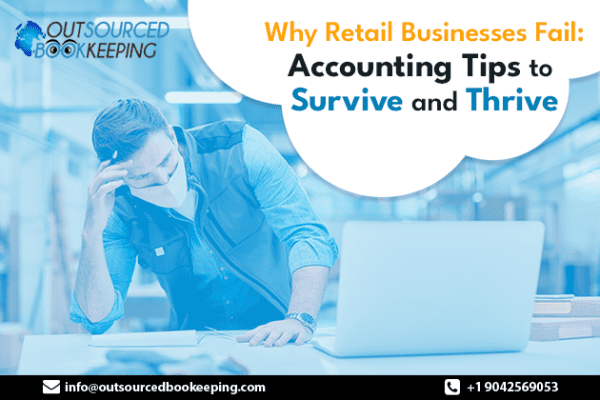Starting a retail venture is exciting and rewarding but comes with many challenges. The SBA reports that only 50% of small businesses survive beyond five years. Poor bookkeeping is a key reason for failure. This article explores why retail businesses fail and provides accounting tips to help them thrive in a competitive market.

Reasons why Retail Businesses fail:
Poor management of cash flow – Efficient cash flow management is vital for business survival. Retail ventures risk financial trouble if bills aren’t paid on time. Common causes of cash shortages include slow sales, high inventory costs, and poor payment collection. The absence of accounts receivable services also contributes to the issue.
Inaccurate records in finance – Precise financial documentation is vital to facilitate shrewd business choices. A retail business owner who doesn’t maintain accurate financial records may find it challenging to make informed financial decisions since they won’t have a clear understanding of their incoming and outgoing finances.
Failing to manage inventory – Inefficient handling of stock can pose a significant challenge for retail enterprises as inventory plays a vital role in driving revenue. Poor management of inventory can result in excess inventory, insufficient inventory, or inventory that becomes outdated. These issues can significantly harm the financial performance of a business.
Lack of proper budget – Retail businesses must have a comprehensive grasp of their financial status and formulate appropriate strategies due to the absence of adequate budgeting.
Failing to adapt to the changing market – The inability to keep up with market variations can rapidly lead retail businesses to lag behind their rivals, as the industry undergoes continuous transformations. Retail businesses should stay vigilant about changing market trends and adapt their accounting tips and strategies accordingly to maintain competitiveness.
Accounting tips for Retail businesses:
Keeping accurate financial records – Retail establishments need to maintain accurate records of their earnings and expenditures, encompassing profits, the expense of holding stock, the remuneration of employees, as well as tax liabilities. Business owners can make informed decisions, avoid financial difficulties, and track patterns by keeping precise records. Account payable services must also be kept in check and proper records to be maintained.
Management of cash flow – It is essential for retail businesses to possess a comprehensive comprehension of their cash flow status. This comprises keeping an eye on the cash inflow and outflow, predicting the cash requirements, and devising a strategy to tackle situations of insufficient cash. Adequate management of cash inflows can assist retail businesses in sidestepping monetary complications and guaranteeing ample liquidity to cover their financial obligations and expenditures.
Effective inventory management – Smart inventory management is crucial for retail establishments to balance their stock levels with customer demand and reduce inventory expenses. This involves making precise predictions of demand, closely tracking inventory levels, and frequently evaluating inventory effectiveness.
Maintain a budget – One smart way for retail businesses to monitor their financial performance is by creating and adhering to a well-planned budget that is consistently reviewed for proper tracking. By adhering to a budget, retail enterprises can prevent excessive spending and ensure that they operate within their financial resources.
Implementation of technology – Retail enterprises can leverage technology to enrich their operations substantially. For instance, they can streamline their accounting tips practices, optimize inventory control, and augment customer interactions. Making strategic technology investments can enhance the competitiveness and overall efficiency of retail enterprises.
Consult professionals – Retail businesses should seek guidance from experienced accountants and consultants. Their expertise provides valuable advice on financial management, strategic tax planning, and key factors for retail success.
Ultimately, proficiency in accounting greatly impacts the triumph of retail enterprises. An opportunity for business owners to dominate in a competitive market and make wise decisions is presented by steering clear of typical accounting errors while integrating effective procedures. By doing so, they can effectively manage their finances.
Maintaining precise documentation, monitoring financial statements, and using technology to streamline accounting are key to success. Consulting a skilled accountant provides valuable insights for managing financial challenges and opportunities. A strong accounting foundation helps retail businesses boost profits, reduce risks, and achieve long-term sustainability.
Outsourced Bookkeeping provides bookkeeping and accounting services and is a renowned expert in their field. They have been serving high-profile clients for years and if you need any help, feel free to contact them.








